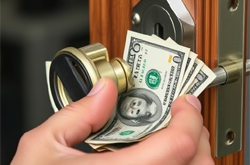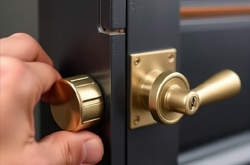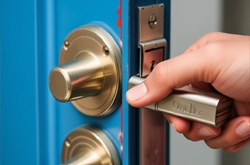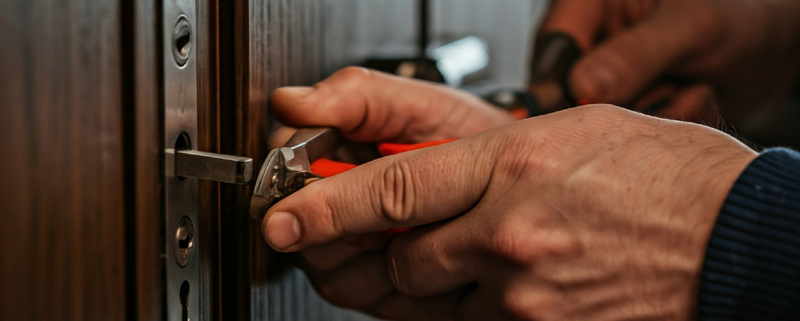Rekeying vs. Replacing Your Locks: Which Option is Right for You?
/in Uncategorized /by Anthony LimpertYour locks are the first line of defense in protecting your home or business. But over time, you may encounter situations that prompt a change. Maybe you’ve lost a key, moved into a new home, or experienced a security breach. When it comes to addressing these concerns, two common choices emerge: rekeying your existing locks or replacing them entirely. Understanding the differences, benefits, and costs of each option can help you decide which path best aligns with your needs.
What Does Rekeying Involve?
Definition: Rekeying a lock means adjusting the internal components—specifically the pins and tumblers—so the lock can be operated by a new key. It does not replace the lock itself; instead, it alters the locking mechanism inside the existing hardware.
Process: A locksmith will remove the lock cylinder, rearrange the pins, and issue you a new key that matches the updated configuration. The old keys will no longer work, effectively giving you control over who has access without changing the hardware on your door.
Pros of Rekeying:
 More Affordable: Rekeying typically costs less than installing all new locks since you’re not paying for new hardware.
More Affordable: Rekeying typically costs less than installing all new locks since you’re not paying for new hardware.- Maintains Current Hardware: If you like your existing lock fixtures or recently invested in quality locks, rekeying keeps that investment intact while updating security.
- Quick and Convenient: Rekeying is usually a faster process than full replacement and can often be done on-site in a single visit.
When to Consider Rekeying:
- You’ve Moved into a New Home: After taking ownership of a new home, rekeying ensures that former occupants, contractors, or real estate agents can no longer gain entry.
- Lost or Stolen Keys: If you’ve lost your keys or suspect they’ve been stolen, rekeying is a quick and cost-effective way to restore security.
- Consolidating Keys: If you have multiple locks that require different keys, a locksmith may be able to rekey them to work with a single master key—simplifying your life.
What Does Rekeying Involve?
 Definition: Replacing locks means removing your existing lock hardware—knobs, handles, deadbolts—and installing entirely new units.
Definition: Replacing locks means removing your existing lock hardware—knobs, handles, deadbolts—and installing entirely new units.
Process: A locksmith or qualified installer removes the old lock and fits a new one in its place. This often involves ensuring the door frame, strike plate, and bolt align properly. Upgrading to high-security or smart locks is also simpler during a full replacement.
When to Consider Replacing Locks:
- Old or Damaged Hardware: If your locks are outdated, heavily worn, or frequently malfunctioning, replacement ensures reliable operation and enhanced security.
- Upgrading Security Features: If you want to invest in high-security locks, electronic keypads, or smart lock technology, a full replacement is often the best route.
- Aesthetic Changes: If you’re renovating your home or office and want modern fixtures that match your new décor, replacing locks can deliver both style and security.
Pros of Replacing Locks:
 Increased Security Options: With a lock replacement, you have the freedom to choose from a wide range of modern lock types, finishes, and advanced features.
Increased Security Options: With a lock replacement, you have the freedom to choose from a wide range of modern lock types, finishes, and advanced features.- Enhanced Durability: New locks come with fresh components that are less prone to wear and tear, ensuring smooth operation for years to come.
- Complete Peace of Mind: Knowing you have brand-new hardware provides confidence that your door’s first layer of security is up to current standards.
Rekeying vs. Replacing: Factors to Consider
Definition: Replacing locks means removing your existing lock hardware—knobs, handles, deadbolts—and installing entirely new units.
Process: A locksmith or qualified installer removes the old lock and fits a new one in its place. This often involves ensuring the door frame, strike plate, and bolt align properly. Upgrading to high-security or smart locks is also simpler during a full replacement.

1. Cost
- Rekeying: Generally more budget-friendly, as you’re only paying for a service call and new key pins.
- Replacing: Higher initial cost, since you’ll pay for new lock sets and installation fees.

2. Hardware Quality
- Rekeying: A good choice if your current locks are in excellent shape and you simply want to ensure no unauthorized keys exist.
- Replacing: Perfect for those who have aging, poor-quality locks, or who want to upgrade to premium hardware.

3. Security Needs
- Rekeying: Addresses immediate security concerns (lost or stolen keys) without major changes to your setup.
- Replacing: Offers an opportunity to upgrade to high-security locks, anti-bump/deadbolt features, or smart locking solutions.

4. Aesthetics and Technology
- Rekeying: Maintains the current appearance and function of your locks.
- Replacing: Lets you match new locks to updated home décor or integrate smart technology for convenience and remote access.
Common Scenarios
 Scenario 1: Just Moved into a New Home
Scenario 1: Just Moved into a New Home
- Recommendation: Rekey the existing locks for peace of mind and cost-effectiveness.
Scenario 2: Worn-Out Deadbolt That Sticks Constantly
- Recommendation: Replace the lock with a higher-quality or modern lock to improve functionality and security.
Scenario 3: Desire for a Smarter Entry System
- Recommendation: Replace your existing locks with a smart lock system that offers keyless entry, remote control via smartphone, or voice command integration.
Scenario 4: Lost Your Keys Recently
- Recommendation: Rekey your locks to prevent unauthorized access by anyone who might find the old keys.
Consult a Professional Locksmith
 When in doubt, seek professional guidance. A licensed, insured locksmith can assess the condition of your locks, discuss your security goals, and recommend the best solution—whether that’s rekeying, replacing, or even a combination of both. With professional expertise on your side, you can make an informed decision that aligns with your budget, taste, and long-term peace of mind.
When in doubt, seek professional guidance. A licensed, insured locksmith can assess the condition of your locks, discuss your security goals, and recommend the best solution—whether that’s rekeying, replacing, or even a combination of both. With professional expertise on your side, you can make an informed decision that aligns with your budget, taste, and long-term peace of mind.
Conclusion
Choosing between rekeying and replacing your locks doesn’t have to be a daunting decision. By considering factors like cost, desired security level, and overall condition of your current hardware, you can find the best solution for your home or business. Rekeying is a convenient, cost-effective way to enhance security without changing your hardware, while replacing locks gives you the freedom to upgrade both security and aesthetics.
Need help deciding or ready to take action? Contact First Class Locksmith today. Our experienced technicians are here to help you secure your space, one lock at a time.





